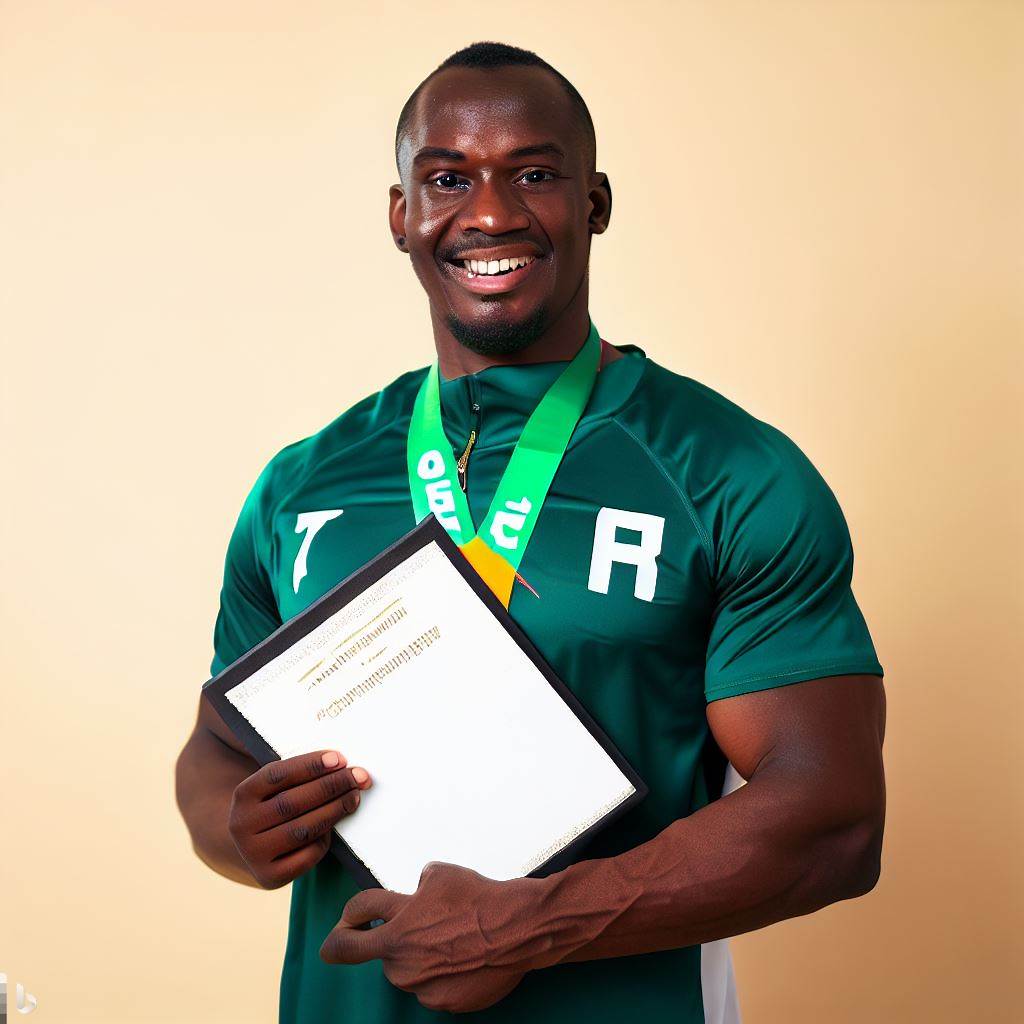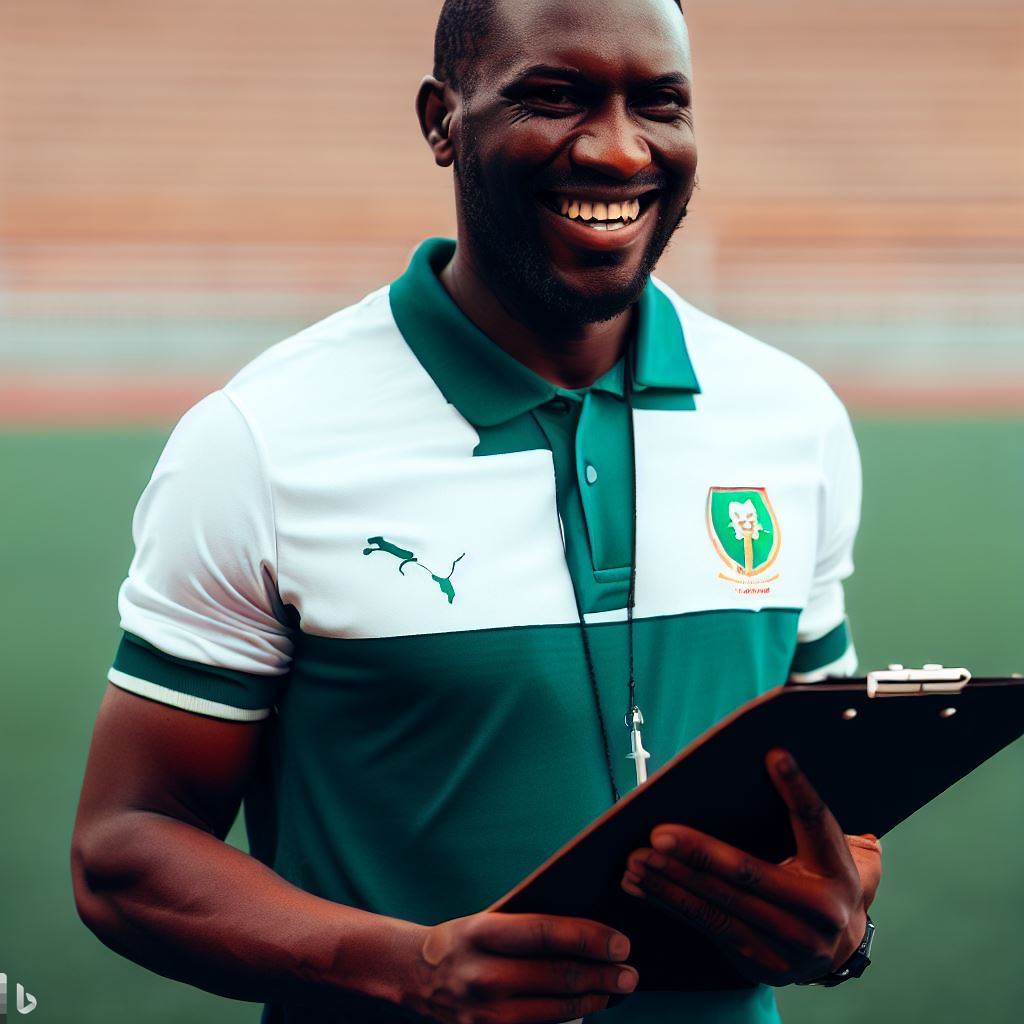Introduction
In Nigeria, being an assistant coach brings immense importance to a team’s success.
The role involves collaborating with the head coach in implementing training strategies, analyzing game footage, and providing valuable feedback to players.
Nigeria’s sports scene is vibrant, with football and athletics being the most popular disciplines.
Football brings immense pride to Nigerians, and the national team, the Super Eagles, has achieved great success over the years.
Athletics, particularly track and field, has also produced world-renowned athletes like Blessing Okagbare and Divine Oduduru.
The daily routine of an assistant coach in Nigeria typically starts early in the morning with planning training sessions, reviewing previous games, and analyzing opponents’ strategies.
The assistant coach works closely with players, helping them refine their skills, improve their fitness levels, and develop their tactical understanding of the game.
Assistant coaches in Nigeria also play a vital role in maintaining discipline and fostering team spirit.
They create a supportive and motivating environment, ensuring that players’ mental well-being is taken care of.
The assistant coach’s responsibilities extend beyond the field as they also assist with administrative tasks such as organizing team travel, managing equipment, and handling logistics.
They act as a bridge between the players and the head coach, facilitating effective communication and ensuring a cohesive team dynamic.
Lastly, the role of an assistant coach in Nigeria is vital for the success of a team.
They contribute to the overall development of players, support the head coach, and play a crucial role in Nigeria’s sports scene, which has a deep passion for football and athletics.
Qualifications and Responsibilities of an Assistant Coach
Required qualifications and certifications
- An assistant coach in Nigeria must possess a minimum of a coaching certificate.
- Knowledge of the game’s rules and tactics is essential.
- Experience in playing or coaching at a high level is preferable.
- Strong leadership and communication skills are crucial for effective coaching.
- Assistant coaches should have a solid understanding of sports science and injury prevention.
Role in player development
- An assistant coach plays a vital role in the development of players.
- They assist in improving players’ technical skills, tactical understanding, and physical fitness.
- Assistant coaches design and implement training programs that address individual and team needs.
- Mentoring and motivating players to achieve their full potential is an important responsibility.
- They provide feedback, guidance, and support to players during practice sessions and matches.
Support for the head coach
- An assistant coach provides valuable support to the head coach in various aspects.
- They help in planning and organizing training sessions, team strategies, and game tactics.
- Assistant coaches assist in scouting opponents and analyzing their strengths and weaknesses.
- They contribute to team selection and preparation for matches.
- During matches, assistant coaches provide input and suggestions to the head coach.
Relationship with athletes
- An assistant coach should establish a positive and respectful relationship with athletes.
- They create a supportive and inclusive team environment where athletes feel valued.
- Assistant coaches foster strong communication and trust with their athletes.
- They offer guidance and encouragement to help athletes overcome challenges and improve performance.
- Building a strong bond with athletes helps maximize their potential and fosters team cohesion.
Most importantly, being an assistant coach in Nigeria requires specific qualifications and certifications.
The role involves player development, support for the head coach, and building relationships with athletes.
Assistant coaches play a crucial part in nurturing talent, providing guidance, and contributing to team success.
Read: Success Stories: Sports Nutritionists in Nigeria
Morning Routine
Mornings in Nigeria as an assistant coach brim with energy, promising productivity. Early risings and prep are vital.
Training plans, my initial focus, aid in drill understanding, ensuring effective assistance. Equipment organization, cones, balls, and gear, precedes athletes’ arrival.
We initiate warm-ups, preventing injuries, mentally and physically prepping players. Close form scrutiny ensures exercise correctness.
Personal connection fosters rapport and trust, crucial in the coach-athlete relationship. Warm-ups culminate, athletes ready physically and mentally.
My satisfaction lies in their preparedness. Morning routines establish discipline, organization, and a positive team atmosphere.
Completed tasks set the tone, leading to confidence and readiness for the main training session.
Being a Nigerian assistant coach demands dedication, attention to detail, and boundless sports passion.
Each morning presents challenges and opportunities to positively impact athletes’ lives.
Read: Roles & Responsibilities of a Fitness Nutritionist
Training Sessions
Training sessions are a crucial aspect of being an assistant coach in Nigeria.
As an assistant coach, one of my primary responsibilities is to assist in designing drills and workouts for the athletes.
This requires a deep understanding of the sport and knowledge of effective training techniques.
During training sessions, I actively observe and analyze the athletes’ performances.
This allows me to provide instant feedback and instructions to help them improve their skills and technique.
Whether it’s correcting a player’s shooting form or giving tactical advice, my goal is to help them reach their full potential.
Monitoring progress is another essential task during training sessions. I keep track of the athletes’ development, assessing their strengths and weaknesses.
By knowing their individual capabilities, I can tailor training programs to address specific areas of improvement. This involves setting goals and milestones to ensure constant progress.
While training can be physically demanding, it is crucial to maintain a positive and motivating environment.
As an assistant coach, I offer encouragement and support to athletes. This boosts their confidence and allows them to push themselves further.
I celebrate their achievements and provide reassurance during challenging times.
Flexibility is key during training sessions.
Sometimes, the original plan needs to be adapted to cater to unforeseen circumstances or individual needs.
Whether it’s modifying the intensity of the training or adding additional exercises, I always prioritize the athletes’ well-being and adjust the plan accordingly.
As an assistant coach, I play a vital role in training sessions, assisting in designing drills and workouts, providing feedback and instructions, monitoring progress, and adapting the training plan when necessary.
This comprehensive approach ensures that the athletes receive the best possible guidance and support to excel in their sport.
Read: Nigeria’s Top Schools for Sports Nutrition Training

Tactical Analysis and Strategy
Tactical analysis and strategy play a crucial role in the day-to-day activities of an assistant coach in Nigeria.
By studying and analyzing opponents, collaborating with the head coach, developing game plans and tactics, and implementing strategies during training, the assistant coach contributes significantly to the team’s success.
Study and analysis of opponents
- The assistant coach spends hours studying and analyzing opponents’ playing styles, strengths, and weaknesses.
- Through video analysis and scouting reports, they gather information to devise effective strategies.
- Identifying key players and studying their individual traits helps in formulating targeted game plans.
- By understanding opponents’ patterns, the assistant coach strives to exploit weaknesses and neutralize strengths.
Collaborating with the head coach
- Effective collaboration between the assistant coach and head coach is essential for a cohesive team strategy.
- They discuss opponents’ analysis, player capabilities, and collectively determine the team’s overall approach.
- Brainstorming sessions help in aligning tactics and creating a unified vision that maximizes the team’s potential.
- The assistant coach offers valuable insights and suggestions during strategic discussions with the head coach.
Developing game plans and tactics
- Based on the opponent’s analysis, the assistant coach formulates game plans specific to each upcoming match.
- They design tactical approaches that exploit weaknesses and take advantage of the team’s strengths.
- The assistant coach considers factors like player fitness, conditions, and match importance while developing strategies.
- By creating adaptable tactics, they prepare the team for different scenarios that may arise during the game.
Implementing strategies during training
- The assistant coach actively incorporates the devised strategies into the team’s training sessions.
- They focus on training drills that align with the team’s tactical approach and game plan.
- By emphasizing specific skills and strategies, the assistant coach helps players understand their roles and responsibilities.
- During mock game scenarios, they ensure players are well-prepared to execute strategies effectively.
- The assistant coach provides feedback and fine-tunes strategies based on players’ performance and execution in training.
In general, the tactical analysis and strategy aspect of an assistant coach’s role in Nigeria involves studying opponents, collaborating with the head coach, developing game plans, and implementing strategies during training.
By investing time and effort into these areas, the assistant coach significantly contributes to the team’s success on the field.
Read: Salary Insights for Fitness Nutritionists in Nigeria
Administrative Tasks
Assisting in scheduling and organizing competitions
As an assistant coach in Nigeria, one of my primary responsibilities is to assist in scheduling and organizing competitions.
This involves coordinating with other teams and associations to determine suitable dates, locations, and formats for the events.
I actively participate in the decision-making process, offering suggestions and recommendations based on the team’s strengths, weaknesses, and goals.
This collaborative effort ensures that our team has a challenging yet manageable competition schedule.
Documenting player attendance and performance data
Another crucial administrative task I perform is documenting player attendance and performance data.
This information is vital for monitoring player progress, evaluating performance, and making informed decisions.
I maintain meticulous records of each player’s attendance at training sessions, practice matches, and official competitions.
Additionally, I track individual player statistics, such as goals scored, assists, and overall performance ratings.
Supporting team logistics, travel, and accommodation
To ensure that the team can focus solely on their performance, I take charge of supporting team logistics, travel, and accommodation arrangements.
This involves coordinating transportation, booking hotels or accommodations, and managing player and staff itineraries.
I work closely with team management and suppliers to ensure that all necessary arrangements are in place and meet the team’s requirements.
This enables the players and coaching staff to concentrate on their preparations without any distractions or logistical worries.
Liaising with other staff members and sports associations
As an assistant coach, I serve as a liaison between the coaching staff, management, and other sports associations.
Effective communication is key to ensuring a smoothly run team and successful collaborations.
I regularly engage with other staff members, such as physiotherapists, team doctors, and fitness trainers, to provide input and receive updates on player fitness, injuries, and overall well-being.
Additionally, I maintain open lines of communication with sports associations for tournaments, rule clarifications, and administrative matters.
Generally, administrative tasks play a vital role in the day-to-day operations of an assistant coach in Nigeria.
Assisting in scheduling competitions, documenting player data, supporting logistics, and liaising with staff and associations are crucial to the team’s success.
You Might Also Like: Challenges in Assistant Athletic Training: Nigeria’s Scene
Support and Mentorship
A day in the life of an assistant coach in Nigeria involves not only training and strategizing, but also providing valuable support and mentorship to athletes.
Here are some ways assistant coaches fulfill this role:
Providing emotional support to athletes
Assistant coaches in Nigeria understand the importance of supporting athletes not just physically, but also emotionally.
They offer a listening ear and provide guidance during challenging times.
- Actively listen to athletes’ concerns and offer empathetic advice.
- Help athletes cope with disappointment and lift their spirits after a defeat.
- Provide reassurance and encouragement during moments of self-doubt.
Assisting in their personal development
Assistant coaches play a vital role in the personal growth and development of athletes in Nigeria.
- Mentor athletes in setting and achieving personal goals.
- Help athletes develop discipline and self-motivation.
- Teach life skills such as time management and resilience.
Motivating and inspiring athletes
In Nigeria, assistant coaches understand that motivation and inspiration are essential for athletes to reach their full potential.
- Energize athletes through pre-game speeches and pep talks.
- Use positive reinforcement to celebrate athletes’ achievements and milestones.
- Organize team-building activities to foster a competitive spirit among athletes.
Building team spirit and camaraderie
Assistant coaches in Nigeria recognize that a cohesive team is the foundation of success.
- Create opportunities for team bonding and social interaction.
- Encourage mutual respect and cooperation among athletes.
- Foster a sense of belonging and unity within the team.
By providing emotional support, assisting in personal development, motivating athletes, and building team spirit, assistant coaches in Nigeria contribute significantly to the success and well-being of the athletes they work with.
They go beyond their coaching duties, becoming mentors and motivators, helping athletes grow both on and off the field.
Challenges and Rewards
Dealing with the pressure and expectations
- As an assistant coach in Nigeria, there is immense pressure to deliver results and meet expectations.
- Coaches are under constant scrutiny and must navigate high stakes situations with composure.
- The pressure can be overwhelming but it is essential to stay focused and maintain a positive mindset.
- Managing the expectations of athletes, parents, and team management requires effective communication skills.
- It is crucial to set realistic goals and foster a supportive environment to help athletes thrive.
Overcoming language and cultural barriers
- Language and cultural barriers can pose significant challenges for an assistant coach in Nigeria.
- Communication is key, and learning the local language or using translators can bridge the gap.
- Understanding and respecting cultural norms is essential to building trust and establishing rapport with athletes.
- Coaches must adapt their coaching style to align with the cultural context and preferences of the team.
- Overcoming these barriers can create a sense of unity and enhance the coach-athlete relationship.
Seeing athletes progress and succeed
- One of the most rewarding aspects of being an assistant coach is witnessing athletes progress and succeed.
- Seeing the fruits of their hard work and dedication is incredibly fulfilling.
- Coaches can take pride in their role in the growth of their athletes, both on and off the field.
- It is gratifying to see athletes achieve their goals, gain confidence, and excel in their sport.
- These moments of success reinforce the importance of coaching and provide motivation to continue.
Personal and professional growth as a coach
- Being an assistant coach in Nigeria offers opportunities for personal and professional growth.
- Coaches continuously learn from their experiences, challenges, and successes.
- Each coaching session presents a chance to refine skills, develop strategies, and expand knowledge.
- Interactions with different athletes and coaches provide valuable insights and perspectives.
- Personal development is a continuous journey and being an assistant coach in Nigeria is a catalyst for growth.
Ultimately, being an assistant coach in Nigeria comes with its challenges and rewards.
The pressure and expectations placed on coaches can be intense, requiring composure and effective communication skills.
Overcoming language and cultural barriers is crucial in establishing a harmonious coach-athlete relationship.
Witnessing athletes progress, succeed, and achieve their goals is one of the most rewarding aspects of coaching.
Additionally, being an assistant coach in Nigeria offers opportunities for personal and professional growth, serving as a catalyst for continuous learning and development.
Conclusion
- To recap, being an assistant coach in Nigeria is a demanding and fulfilling role.
- We must acknowledge the valuable contributions made by assistant coaches in the development of Nigerian athletes.
- To aspiring coaches, I encourage you to pursue your passion and embrace the challenges that come with the job.
- In summary, the life of an assistant coach in Nigeria is a journey of dedication, mentorship, and growth.




